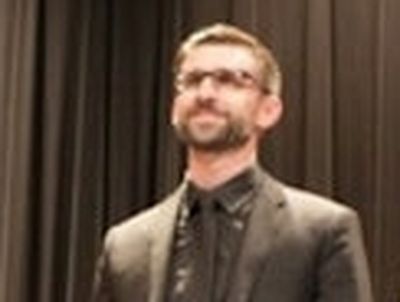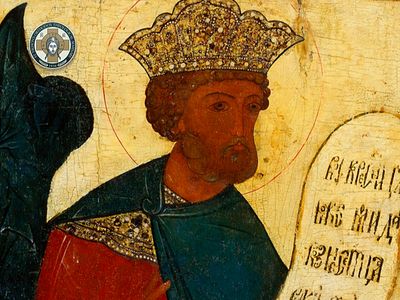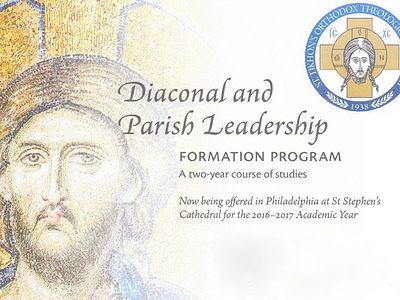Source: The Scranton Times-Tribune
South Canaan, November 28, 2016
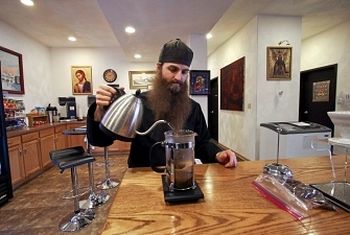 Daniel Armstrong, a monk at St. Tikhon's Monastery, prepares a French press as he makes coffee inside the bookstore at 175 St. Tikhons Road in Waymart. The monastery recently opened Burning Bush Coffee Roasting, where they prepare and package coffee beans from around the world. Michael J. Mullen / Staff Photographer
Daniel Armstrong, a monk at St. Tikhon's Monastery, prepares a French press as he makes coffee inside the bookstore at 175 St. Tikhons Road in Waymart. The monastery recently opened Burning Bush Coffee Roasting, where they prepare and package coffee beans from around the world. Michael J. Mullen / Staff Photographer
Father Innocent Neal, a Russian Orthodox priest who looks the part with a full brown beard and gentle eyes, draws a short, narrow scoop from the churning drum and inhales, seeking sensory milestones from the beans.
Wet grass, then hay, then bread, he explains, are the scent stages that lead to a perfect roast. The beans in the metal scoop smell more like wet grass, so he slides it back in place to continue roasting.
The clergy at St. Tikhon’s Bookstore, the nation’s largest Orthodox bookstore, and printing press, started Burning Bush Coffee Roasters in January. Since then, the monks embraced roasting and became experts.
The name Burning Bush Coffee Roasters derives meaning from the Old Testament story of Moses and the burning bush that Christianity says signaled the eventual holy conception in Mary — both perfect vessels unconsumed by the fire inside them.
Father Innocent, who like other Orthodox clergy prefers to be called by first name only, manages the bookstore. A longtime coffee aficionado, he roasted coffee in small batches long before considering it could supplement the bookstore sales — a business to support the ministry of 12 monks who live and work at the Monastery of St. Tikhon of Zadonsk and teach at the affiliated St. Tikhon’s Orthodox Theological Seminary across the street.
Founded in 1905, St. Tikhon’s is the country’s oldest Orthodox monastery.
“Father Innocent was roasting at home, and he’d share it with us every now and then,” said Father Daniel Armstrong.
The monks and the priest began stewing up a way to convince their abbot, Father Igumen Sergius, to green-light a commercial roastery in the already-busy bookstore and printing press operation.
It was easier than expected.
“Somehow, it all just fell into place,” said Father Daniel, who had the initial task of pitching to the abbot.
With the abbot’s blessing, they needed a hand up to get the roasting started.
Enter Father Alexis Baldwin, a priest who grew up in southeast Mississippi and graduated from St. Tikhon’s seminary in 2013. During his schooling, Father Alexis ran the seminary kitchen and catered events for the monastery.
He also spent more than a decade working in the coffee business, and even now at his ministry post in Aiken, South Carolina, near the Georgia border, he works part-time roasting for an independent chain of coffee shops.
After learning about St. Tikhon’s newest endeavor, Father Alexis lent his expertise and visited for a day and a half to help Father Innocent get familiar with the roaster and hone their style.
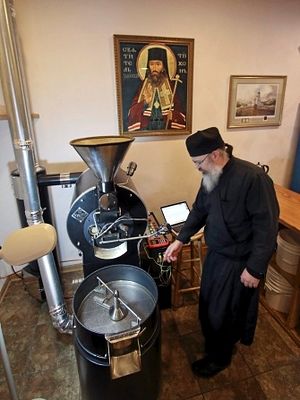 Stephen Lindell, a monk at St. Tikhon's Monastery, operates a coffee roaster inside the bookstore at 175 St. Tikhons Road in Waymart. The monastery recently opened Burning Bush Coffee Roasting, where they prepare and package coffee beans from around the world. Michael J. Mullen / Staff Photographer
Stephen Lindell, a monk at St. Tikhon's Monastery, operates a coffee roaster inside the bookstore at 175 St. Tikhons Road in Waymart. The monastery recently opened Burning Bush Coffee Roasting, where they prepare and package coffee beans from around the world. Michael J. Mullen / Staff Photographer
Tracking each roast helps them tweak the process, he explained.
Burning Bush roasts 10 pounds at a time, and just 80 to 100 pounds per week. The monks sell hot coffee from the bookstore for $1 a cup, and also in 12-ounce, one-pound and five-pound packages from the store and online at www.stspress.com. The coffee costs around $15 for a one-pound package, depending on variety. Burning Bush also has its own Monastery Blend roasted with South American and African beans.
Using a scale and a filter in a ceramic cone, Father Daniel pours water from a long-necked kettle over freshly ground coffee weighed to the gram. A timer ticks off the seconds, keeping his pour on pace for single, perfect cup.
“We don’t roast dark,” Father Innocent said, just before Brother Stephen opens the hatch to let a fresh batch of Ethiopian beans pour from the drum. “What we’re really trying to do is bring out the characteristics of the bean.”
This particular batch, from the Hambela Farm in the south central part of the African country, has a clean taste with notes of berry, citrus and baking cocoa.
“It’s really fun working with them,” said Ricky Balzac, of the Balzac Brothers and Co., Burning Bush’s importer in Charleston, South Carolina. “They’re happy to do business and buy responsibly.”
Mr. Balzac’s brother, Brendan, handles the Burning Bush account.
Ricky Balzac described an extensive sampling process in which he, his brother, sister, father and other staff first roast a sample from a courting grower.
Then, if they like the coffee and agree on a price, they receive and roast a second sample before shipment. When their full order arrives, they again roast another sample to taste.
Mr. Balzac’s great grandfather started the company in New York in 1917.
“They would literally get on a boat, go to Columbia, pick up some coffee and bring it back,” he said. “It was a little bit simpler in some ways back then.”
Now, they import coffee from around the world for a more demanding market.
“We sort of see the industry moving more toward specialties,” Mr. Balzac said. “It’s kind of like the brewing industry in that there’s all these micro-roasteries popping up everywhere, and they all want different coffees, and they all want to know the different stories of each of those coffees.”
Burning Bush is the only Orthodox roastery among their 200 or so customers that include coffee shops and home roasters, he said.
Specialty coffee is a natural muse for Orthodox clergy.
Father Alexis and his wife, a self-employed music therapist, both work multiple jobs. They have four boys, all under age 7. The sounds of their sons playing echoed in the background as he spoke on the telephone.
“Coffee is a very important part of our lives,” he said. “It’s such a joyful thing.”

